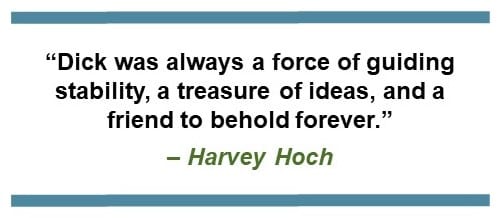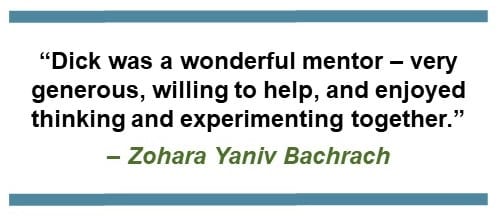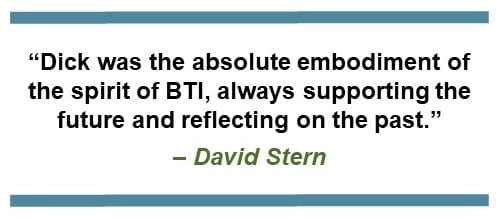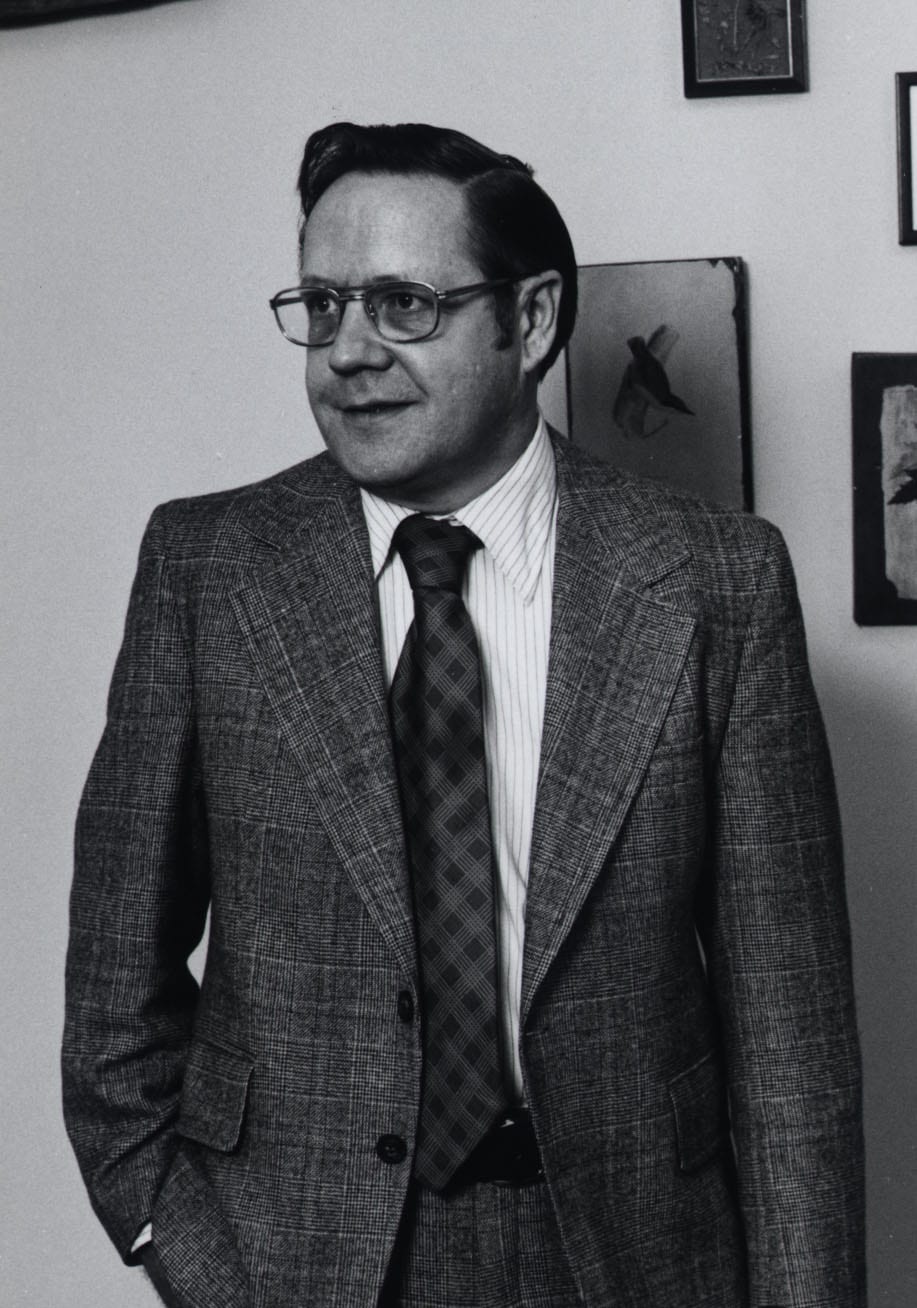News
Reflections on Dick Staples
Dick Staples was an essential member of BTI and the broader plant science community for more than 70 years, from his early days as a graduate student, decades as a faculty member, to his most recent role as an Emeritus Professor. With his passing on January 15, two weeks shy of his 95th birthday, Dick will be remembered both as a brilliant and creative scientist, as well as a generous friend and mentor.
Since his passing, former colleagues of Dick’s have shared reflections, which we are pleased to share with you below. You may also like to read his official obituary, a brief biography of his career, and a lovely piece about him in The Scientist.
Dick leaves behind his loving family: his wife of 66 years, Mildred, three children and four grandchildren.
Harvey Hoch, Professor Emeritus of Plant Pathology, Cornell University
Dick Staples spent much of his scientific career studying fungi that cause rust diseases of plants, most notably that of bean, caused by Uromyces appendiculatus. Dick was a respected scientist and authority on the topic, having made numerous significant contributions to the understanding of Uromyces over the course of his career.
After 25 years of rust research, Dick became interested in learning more about the cellular and structural machinery within the fungus that corresponded with biochemical changes associated with the development of the specialized infection apparatus, called appressoria, from which the fungus gains entry into its host. Coincidentally, at this time, I was looking to team up with someone who could integrate some biochemical perspectives into my microscopy and cytology approaches to fungal cell biology.
I recall meeting in Dick’s office at BTI around 1981, and each of us excitingly telling each other about our research projects, and further discovering to our surprise that we both earned undergraduate degrees from Colorado State University. We began our 20-year plus collaborative research, mostly exploring what triggers appressorium initiation. Dick — with his biochemistry expertise — suggested studying how differentiation proteins, cAMP, potassium ions, and other controlling chemicals influence the role of actin and microtubules in Uromyces leading to cell growth and appressorium development.
The highlight of our collaboration was when we incorporated microfabrication technologies to create well-defined surface topographies that led to the discovery that one-half micron high ridges were the physical feature that triggered thigmotropic initiation of appressorium development, and related such heights to features of bean plant stomata.
 Together we garnered many research grants and penned nearly 50 research papers and reviews. We traveled to each other’s laboratory (mine being in Geneva), often once a week to explore ideas, research, and write. After Dick retired in 1992, and not quite ready to give up research, he drove to Geneva at least two, if not three, days a week to continue exploring the mysteries of the rust fungi for nearly another 10 years. Everyone in the lab knew the day he was coming, and were excited to welcome his arrival — not just for his ideas and interest in what they were doing, but equally so for his pleasing and gentle demeanor — always the gentleman scientist. Unless there were special occasions, we ate lunch together, Dick with his everyday peanut butter and jelly sandwich — always, always, always! We alleged his arteries flowed with peanut butter and jelly! Perhaps why he lived nearly 95 years?
Together we garnered many research grants and penned nearly 50 research papers and reviews. We traveled to each other’s laboratory (mine being in Geneva), often once a week to explore ideas, research, and write. After Dick retired in 1992, and not quite ready to give up research, he drove to Geneva at least two, if not three, days a week to continue exploring the mysteries of the rust fungi for nearly another 10 years. Everyone in the lab knew the day he was coming, and were excited to welcome his arrival — not just for his ideas and interest in what they were doing, but equally so for his pleasing and gentle demeanor — always the gentleman scientist. Unless there were special occasions, we ate lunch together, Dick with his everyday peanut butter and jelly sandwich — always, always, always! We alleged his arteries flowed with peanut butter and jelly! Perhaps why he lived nearly 95 years?
As he did in Ithaca, Dick made a point to attend the weekly seminars in Geneva and be an active participant in the department. This, along with his research collaboration, was one reason he was honored as an Adjunct Professor. Dick was always a force of guiding stability, a treasure of ideas, and a friend to behold forever.
Zohara Yaniv Bachrach, Adjunct Professor of Medicinal Plants at The Hebrew University of Jerusalem
I came to BTI as a Post Doc after getting my PhD from Columbia University in Plant Biochemistry. I am an Israeli who came to NYC to study. Dick was a wonderful mentor — very generous, willing to help, and enjoyed thinking and experimenting together. He encouraged my independence and was happy to discuss any new ideas that came up during our research work. During those early days of my scientific career, it was extremely valuable to have a creative and supporting senior scientist next to me.
I have a great story to share: I was hired in the summer of 1967. Dick came to visit us at home in order to get to know me and my husband. I told him that I was five months pregnant, but that I had made all the needed arrangements and that I would be back to the lab very soon (if all went well). He congratulated me.
The next day at work, Dick told me some members of BTI leadership were concerned that I would not come back after I had the baby, so it would be a waste of time and money to bring me on board.* But Dick stuck up for me and fought to make sure that I kept my job.
 Needless to say, in November, a week after the birth of my daughter, I showed up at the Institute, and together with Dick we went around the Institute to say, “Hello.”
Needless to say, in November, a week after the birth of my daughter, I showed up at the Institute, and together with Dick we went around the Institute to say, “Hello.”
I stayed with Dick until 1978, and published 10 papers with him. At that point, BTI moved to Ithaca, and I headed back to Israel with my family.
We stayed in touch during all these years, and I will never forget this early period.
Alan Renwick, BTI Emeritus Professor
My memories of Dick Staples go back to 1960, when I joined BTI as a graduate student, with hopes of following in Dick’s footsteps. I knew him only as a dedicated scientist with lots of advice to offer. But later in my tenure, as I took charge of the analytical services laboratory, Dick offered me space in his lab to conduct wet chemistry that could not be done in the low humidity instrument room.
Dick welcomed me as a member of his scientific family, and I soon became involved in the chemistry of rust spore germination. My association with Dick and his team led to several publications, including two in Science. The enthusiasm of Dick and his colleagues was quite infectious, and I still value the friendships that resulted from this association.
After retirement, I shared space with Dick and others in the “emeritus office” at BTI, and enjoyed continued interactions and frequent talk about “the good old days” in Yonkers.
He will be sorely missed.
Paul Debbie, Director of Research and Director of New Business Development, BTI
The current pandemic has disrupted all of our lives, and one of the cherished “normal” things that we have lost here at BTI over the past year is seeing Dick Staples around the coffee machine in the morning. An almost daily meet and greet with Dick has been a staple of my day for 20 years. He was a man who always had a kind word to say and, despite the fact he had retired years earlier, was tuned in with many things going on at BTI. He stayed connected. When he could, which was often, he would be there dead center in the auditorium for seminars and other events. After I spoke at these events, he would always come and seek me out to compliment me on the talk, or to thank me for something in the presentation. I am sure he did this for many others here at BTI.
 Dick was one of these people who really made working at the Institute fun and rewarding for the folks around him. He was a kind and gentle man, but also tough, in a thoughtful way. He was not afraid to tell you when there was something that he thought should be changed, or how it could be improved for the betterment of life at BTI. The fact that he was not able to spend some of his last year here at BTI doing some of what he clearly enjoyed elevates the sadness of his passing for me.
Dick was one of these people who really made working at the Institute fun and rewarding for the folks around him. He was a kind and gentle man, but also tough, in a thoughtful way. He was not afraid to tell you when there was something that he thought should be changed, or how it could be improved for the betterment of life at BTI. The fact that he was not able to spend some of his last year here at BTI doing some of what he clearly enjoyed elevates the sadness of his passing for me.
Dick, you will surely be missed.
David Stern, BTI President, CEO
Dick joined BTI at its Yonkers, NY facility in 1950 as a graduate student, and retired from research at BTI in 1992. He remained actively interested and involved in the Institute following retirement, and was a regular attendee at my emeritus “coffee klatches” since I became President. In my opinion, Dick was the absolute embodiment of the spirit of BTI, always supporting the future and reflecting on the past.
Dick’s family has requested that donations in his name be made to BTI.
*Present BTI leadership were dismayed to learn of this sort of discrimination in the past, and are proud to know that Dick stood on the side of equity. Today, BTI has a comprehensive benefits package that includes generous paid parental leave for parents of any gender, as well as a generous paid time off policy in support of work/life balance.


